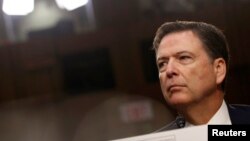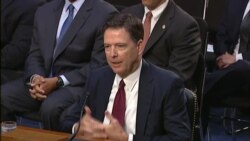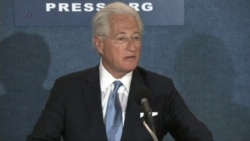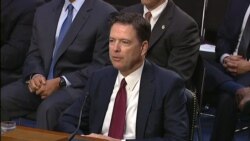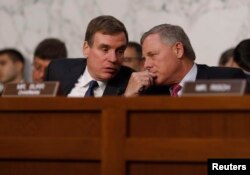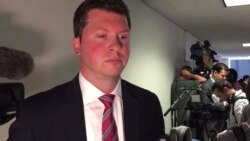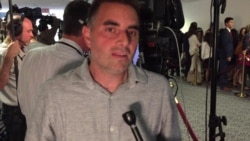Fired FBI Director James Comey says President Donald Trump expected him to pledge his loyalty and urged him to drop the investigation into links between Trump's aides and Russian officials.
Comey's nearly three-hour appearance Thursday before the Senate Intelligence Committee marked his first public comments about nine conversations he said he had with the president in the months before he was fired. The event was covered live by the major U.S. television networks, and seen around the world.
Trump ousted Comey last month, saying he was thinking of "this Russia thing" when he decided to dismiss the chief of the country's top criminal investigative agency while he was leading its Russia probe.
Comey said it was and still is the "high confident judgment" of the U.S. intelligence community that Russia interfered in the 2016 campaign. "It's not a close call," he said.
The former FBI director and prosecutor told lawmakers he was confused by various explanations that Trump and his aides gave for the dismissal and said they "chose to defame me" for his performance as the FBI chief by claiming - wrongly, in Comey's view - that the agency was in disarray.
'Plain and simple,' Comey says, White House lied
"Those were lies, plain and simple," Comey said of the White House contention that he had lost the confidence of the FBI.
Ultimately, Comey said of Trump, "I take him at his word," that he was fired because of the Federal Bureau of Investigation's ongoing Russia investigation.
In his written opening statement, Comey recounted how at a White House dinner in January shortly after Trump assumed power, the president told him, "'I need loyalty, I expect loyalty.' I didn’t move, speak or change my facial expression in any way during the awkward silence that followed. We simply looked at each other in silence."
WATCH: Comey on president's request for loyalty
The committee's top Democrat, Senator Mark Warner of Virginia, called Trump's comments, as recounted by Comey, "very disturbing."
More testimony in secret
Later Thursday the Senate Intelligence Committee reconvened in closed session to continue to hear Comey, who had said he was willing to discuss several matters that should not be made public. Senators met in a portion of the U.S. Capitol configured as a "secure compartmented information facility," built to resist eavesdropping.
Despite his well-known preference for posting quick messages on Twitter, Trump was silent during the Senate hearing Thursday. The president's son, Donald Trump Junior, instead sent out a series of notes criticizing Comey's comments. At the White House, the deputy press secretary, Sarah Huckabee Sanders, said: " I can definitively say the president is not a liar."
WATCH: Trump lawyer on Comey testimony, investigation
Trump's personal attorney, Marc Kasowitz, told reporters the president never discussed "loyalty" with Comey, "in any form or substance," and never "directed or suggested that Mr. Comey stop investigating anyone."
'I hope you can let this go' - an order?
During the portion of his testimony that was open to the public, Comey testified that Trump asked him on February 14 to "let go" of the investigation into Michael Flynn, who had been fired as Trump's national security adviser the previous day, reputedly for lying to Vice President Mike Pence about conversations Flynn had had with Russia's ambassador to Washington. “I hope you can see your way clear to letting this go, to letting Flynn go.” Comey quoted Trump as saying, “He is a good guy. I hope you can let this go.”
WATCH: Comey on request to drop Flynn investigation
Comey acknowledged under questioning that Trump did not order him to stop the investigation of Flynn's connections with Russia, but said, "I took it as direction. This is what he wanted to me to do."
Comey, who did not cut short the FBI probe, said he was "so stunned" by Trump's request to "let go" of the investigation of Flynn that he did not think at the time to tell Trump, "Mr. President, that's wrong."
He said FBI colleagues were as "shocked and troubled as I was" by Trump's comments urging an end to the probe of Flynn.
‘Lift the cloud’
Comey said that in a March 30 phone call, Trump "described the Russia investigation as 'a cloud' that was impairing his ability to act on behalf of the country. ... He asked what we could do to 'lift the cloud.' I responded that we were investigating the matter as quickly as we could, and that there would be great benefit, if we didn't find anything, to having done the work well. He agreed, but then re-emphasized the problem this was causing him."
Comey acknowledged that Trump never explicitly ordered him to end the Russia investigation.
Special Counsel Robert Mueller, another former FBI director, has now taken over a criminal probe of Russia's interference in the election, including whether Trump obstructed justice in urging that the Flynn probe be dropped.
Some opposition Democrats said Trump's request about Flynn amounts to obstruction of justice, an impeachable offense similar to that leading to the 1974 resignation of former President Richard Nixon. Comey said he found Trump's comments to him about the FBI's investigation "very disturbing," but that it was not up to him to decide whether they constituted obstruction of justice.
Within days of Comey's firing, Trump's Justice Department, over the president's opposition, named Mueller to lead the investigation into all aspects of Russia's meddling in the election.
Trump said at the time he thought Mueller's appointment "hurts our country terribly, because it shows we're a divided, mixed-up, not-unified country."
Trump has been dismissive of the Russia probes, calling them "a witch hunt" and saying they are an excuse by Democrats to explain candidate Hillary Clinton's loss in the November election. He has denied any collusion with Russian officials.
WATCH: Washington DC resident on Comey testimony
WATCH: Tourist visiting Washington on why he wanted to attend hearing




